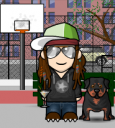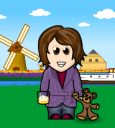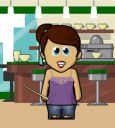Here’s a summary of my proposed first wee bit of my literacy review ……….. it didn’t help stumbling across the recent new debates taking place online this weekend. It’s too late to change track or make any changes now – but this is only a first draft so I’ll keep an eye on what’s happening 🙂

Can Weblogs and Wikis and other associated emerging social software tools be used to create an effective on-line learning community?
The Futurelab website report on Social Software states that the term social software came into use in 2002 and is generally attributed to Clay Shirky. Shirky, a writer and teacher on the social implications of internet technology, defines social software simply as “software that supports group interaction” (Shirky 2003). The report describes Weblogs as easily updatable personal websites, often used as personal journals. The social aspect of weblogs, it says, can be seen in the ability for readers to comment on postings, to post links to other blogs and, through using pingback or trackback functions, to keep track of other blogs referencing their posts. This enables bloggers to know who is referring to and building on what they say in their blogs.
This research looked at specific issues surrounding the development of online identities
‘. …. the perception of an actual or imagined audience prompts us to think about what we wish to show’
‘. ………writing online provides us with the opportunity to “author the self ” (Holland et al. 1998), to sustain a narrative of identity (Giddens 1991), and even to explore a number of different stories of the self, but these identities always are forged through our connection with others.’
They explored the concepts of “affinity spaces” (Gee 2004) and “communities of practice” (Lave and Wenger 1991) in order to try to describe their relationship with others who blog and who seem to operate within a similar “constellation of sites.”
Wenger explains that new technologies such as the Internet have extended the reach of our interactions beyond the geographical limitations of traditional communities, but the increase in flow of information does not obviate the need for community. In fact, it expands the possibilities for community and calls for new kinds of communities based on shared practice.
…………. the concept of community of practice is influencing theory and practice in many domains and that, from humble beginnings in apprenticeship studies, the concept was grabbed by businesses interested in knowledge management and has progressively found its way into other sectors. It has now become the foundation of a perspective on knowing and learning that informs efforts to create learning systems in various sectors and at various levels of scale, from local communities, to single organizations, partnerships, cities, regions, and the entire world.
In this article Dr Gilly Salmon writes that working online is really a new environment for learning, not just a tool and explains that Professor Susan Greenfield, in her recent book Tomorrow’s People, shows us that the accessible and interactive dialogue younger people take for granted has great potential for learning and development, if we can tap into it. The availability of digital resources and the internet as a mediator invites all those seeking learning or understanding to work together in new ways. Online networking is equally as important where there is little consensus about key concepts or rapidly developing knowledge and practice – something that applies to so many professional fields in our time.
………… The online environment provides a medium for communication and also shapes it. Participants do not need permission to contribute and individuals can receive attention from those willing and able to offer it. Face-to-face identities become less important and the usual discriminators such as race, age and gender are less apparent.
Back to Futurelab
…….Communities of practice are groups of people who have specific reasons to have an affinity. It can be an informal network or forum where tips are exchanged and ideas generated (Stewart 1996). It can be a group of professionals, informally bound to one another through exposure to a common class of problems, common pursuit of solutions, and in doing that they become a source of a body of knowledge. Etienne Wenger (Wenger 2000) expands on learning as an inherently social activity. He notes that acquiring knowledge involves an interplay between socially defined knowledge and personal experience which is mediated by membership of a group. Any learning situation has to negotiate both an individual’s experience, and the knowledge that the individual either brings to, or takes from, the group. Hence there is a logical reason to engage in social software. A potential important factor in the use of social software for online communities of practice is the ability to cross boundaries. Learners might be able to join groups in which age, pre-existing knowledge, gender or location are no longer an apparent barrier. There is also no barrier to young learners establishing their own communities and networks.
In The Paper, ‘A Digitally Driven Curriculum’ by Buckingham and McFarlane (2001) remind us that many of today’s children are in fact establishing their own communities and networks using sites such as ‘My Space’, ‘Beebo’, and MSN. He thinks that educators should monopolise on the online communication skills already being developed in the pupils’ lives outside of school.
An article in the Guardian newspaper by Steve O’Hear (20/6/06), explains that the “new” web is already having an impact in class, as teachers start exploring the potential of blogs, media-sharing services, and other social software, which, although not designed specifically for e-learning, can be used to empower students and create exciting new learning opportunities. These same tools allow teachers to share and discuss innovations more easily and, in turn, spread good practice.
A recent HMI Report on Improving Scottish Education includes a section on ‘ICT in Learning and Teaching’ (2007). In the introduction to that report, Graham Donaldson (HM Senior Chief Inspector of Education) states that :
Information and communications technology (ICT) has transformed the means by which we inform ourselves, remain up to date with world event and areas of personal interest, and further our learning. For many, books and journals are no longer the first or primary source of information or learning. We now regularly rely on images, video, animations and sound to acquire information and to learn. Increased and improved access to the internet has accelerated this phenomenon. We now acquire and access information in ways fundamentally different from the pre-ICT era. The findings outlined in this report confirm that Scotland is well placed to build on current strengths in order to realise the full potential of ICT to improve learning and achievement. The challenge is to make that happen.
I spoke to Mary Devine, our Curriculum Development Manager. I wanted to find out my own Authority’s view of using web 2 tools with pupils. Mary left me in no doubt that this is seen as the way forward to develop all sorts of areas of learning. At the moment there is no specific policy in place about the use of these new online tools. The main priority is to find ways of helping teachers to feel comfortable with the new technologies.
I contacted Malcolm Wilson from our I.C.T. support team. The team are happy for teachers to set up class blogs as long as all safety rules are in place. The main recommendation, however, is to ‘go down the road’ of Think.com. Think.com has been in place in the Authoity schools for 5 years.
This view is of the opinion that Educators are typically not neutral about blogging. There are fierce defenders and fierce critics. Each has an important voice. Will Richardson points out, “One of the reasons we fear these technologies is because we as teachers don’t yet understand them or use them. But the reality is that our students already do. It’s imperative that we be able to teach our kids how to use the tools effectively and appropriately because right now they have no models to follow.”
The Paper entitled ‘Emerging Technologies’ by Bob Godwin-Jones (2003), explains that blogs and wikis offer powerful opportunities for online collaboration for learners. He states that the encouragement of peer to peer networking and buddy learning is central to a Constructivist learning approach, and goes on to say that there has been an increasing interest in using blogs in education.
Steve Lee & Miles Berry think that many students find that their learning is most effective when they actively construct knowledge during group social interaction and collaboration. Characteristics of such approaches also include: an awareness of multiple
perspectives, provision of realistic contexts, a sense of ownership and voice,
learning as a social experience, an acknowledgement of multiple modes of
representation and a sense of self-awareness (metacognition, or learning about
learning). These approaches are variously called social constructivism, social
learning, collaborative learning or aggregated learning. The theories of social
constructivist (http://en.wikipedia.org/wiki/Social_constructivism) epistemology and Vygotsky’s ‘zone of proximal development’
(http://en.wikipedia.org/wiki/Lev_Vygotsky) provide a rigorous underpinning for
such pedagogies.
The Concept Classroom Website provides a series of online professional development workshops. In the Constructivism as a Paradigm for Teaching and Learning workshop, it describes that the Constructivist theory states that people construct their own understanding and knowledge of the world, through experiencing things and reflecting on those experiences. A Constructivist teacher encourages pupils to constantly assess how an activity is helping them gain understanding. They become “expert learners” and LEARN HOW TO LEARN. The constructivist classroom, it states, also relies heavily on collaboration.
The Constructivist approaches to learning have led to the development of the Cognitive Apprenticeship theory. Cognitive Apprentices allow the master (teacher) to model behaviours and then imitates them with the master coaching. (Wikipedia).
George Siemens writes that behaviorism, cognitivism, and constructivism are the three broad learning theories most often utilized in the creation of instructional environments. These theories, however, were developed in a time when learning was not impacted through technology.
The starting point of connectivism is the individual. Personal knowledge is comprised of a network, which feeds into organizations and institutions, which in turn feed back into the network, and then continue to provide learning to individual. This cycle of knowledge development (personal to network to organization) allows learners to remain current in their field through the connections they have formed.
Connectivism presents a model of learning that acknowledges the tectonic shifts in society where learning is no longer an internal, individualistic activity. How people work and function is altered when new tools are utilized. The field of education has been slow to recognize both the impact of new learning tools and the environmental changes in what it means to learn. Connectivism provides insight into learning skills and tasks needed for learners to flourish in a digital era.
Post 3 coming up soon 🙂
![]() “
“![]()
![]()
![]() ‘
‘










